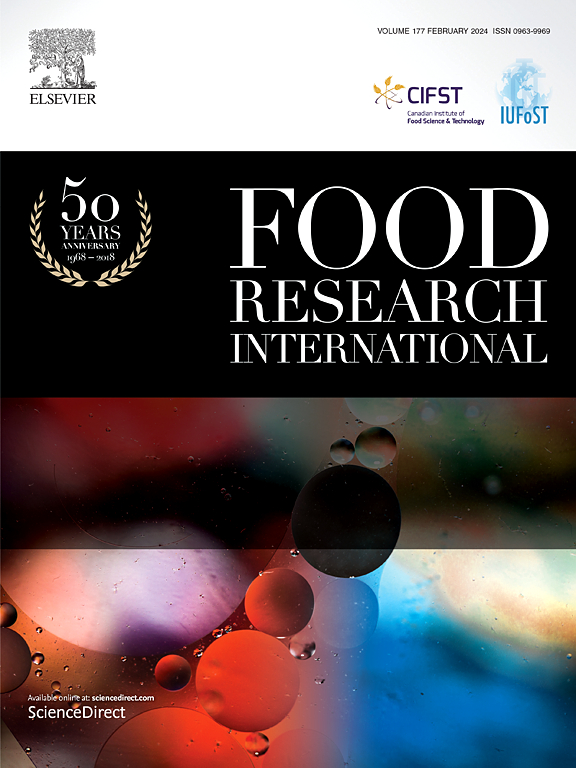阴影中的食品安全:从必要性、企业家精神和活动理论的角度理解黑暗的厨房
IF 8
1区 农林科学
Q1 FOOD SCIENCE & TECHNOLOGY
引用次数: 0
摘要
本研究整合必要性创业与活动理论(AT)的概念,系统检视暗厨外卖食品业者的食品安全状况。采用的混合方法包括深入实地考察、食品安全检查以及对消费者(n = 441)和环境卫生官员(n = 443)进行全国性调查。对21个黑暗厨房的定性分析显示,经营者的背景非常多样化,一些企业家是出于需要而经营,另一些则是利用市场机会。通过验证性因子分析和均值比较对定量数据进行分析。大多数必需品驱动的黑暗厨房,特别是那些在家操作的厨房,表现出对食品安全、非正式做法和资源限制的知识有限;他们将个人的食品安全道德标准置于监管合规之上。相反,以机会为导向的企业家更有可能将食品安全与组织目标结合起来,并拥有更合适的基础设施。在所有评估的维度中,食品安全文件合规性最低(9.5%),其次是员工卫生、技术责任(27.5%)和设施(49.8%)。法规不明确、执行困难以及与检查部门的低参与度加剧了结构和行为上的弱点。调查显示,消费者希望外卖系统能保证最低的卫生标准。环境卫生官员强调了检查和监测黑暗厨房的挑战,特别是考虑到该行业的非正式性和数字碎片化。使用AT框架综合研究结果表明,安全食品(客体)的生产受到主体和所有其他要素之间相互关联的矛盾的影响,特别是在由必需品企业家主导的模型中。本研究为有针对性的政策干预和基于平台的举措提供了证据,以改善新兴食品服务模式中的食品安全。本文章由计算机程序翻译,如有差异,请以英文原文为准。

Food safety in the shadows: Understanding dark kitchens through the lens of necessity entrepreneurship and activity theory
This study integrates the concepts of necessity entrepreneurship and activity theory (AT) to systematically examine the food safety landscape of dark kitchens—delivery-only food businesses. The mixed-method approach adopted included in-depth site visits, food safety inspections, and nationwide surveys of consumers (n = 441) and environmental health officers (n = 443). The qualitative analysis of 21 dark kitchens revealed highly diverse operator profiles, with some entrepreneurs operating out of necessity and others capitalising on market opportunities. Quantitative data was analysed through confirmatory factor analysis and mean comparisons. Most necessity-driven dark kitchens, particularly those operating from home, demonstrated limited knowledge of food safety, informal practices, and resource constraints; they prioritised personal moral standards of food safety over regulatory compliance. Conversely, opportunity-oriented entrepreneurs were more likely to align food safety with organisational objectives and had a more appropriate infrastructure in place. Compliance with food safety documentation was the lowest of all the dimensions assessed (9.5 %), followed by employee hygiene, technical responsibility (27.5 %), and facilities (49.8 %). Structural and behavioural weaknesses were exacerbated by unclear regulations, difficulties in enforcement, and low engagement with inspection authorities. As per the surveys, consumers expect food delivery systems to guarantee minimum hygiene standards. The environmental health officers highlighted the challenges of inspecting and monitoring dark kitchens, particularly considering the sector's informality and digital fragmentation. Synthesising the findings using the AT framework shows that the production of safe food (objects) is affected by interconnected contradictions between subjects and all other elements, especially in models dominated by necessity entrepreneurs. This study provides evidence for targeted policy interventions and platform-based initiatives to improve food safety in emerging food service models.
求助全文
通过发布文献求助,成功后即可免费获取论文全文。
去求助
来源期刊

Food Research International
工程技术-食品科技
CiteScore
12.50
自引率
7.40%
发文量
1183
审稿时长
79 days
期刊介绍:
Food Research International serves as a rapid dissemination platform for significant and impactful research in food science, technology, engineering, and nutrition. The journal focuses on publishing novel, high-quality, and high-impact review papers, original research papers, and letters to the editors across various disciplines in the science and technology of food. Additionally, it follows a policy of publishing special issues on topical and emergent subjects in food research or related areas. Selected, peer-reviewed papers from scientific meetings, workshops, and conferences on the science, technology, and engineering of foods are also featured in special issues.
 求助内容:
求助内容: 应助结果提醒方式:
应助结果提醒方式:


